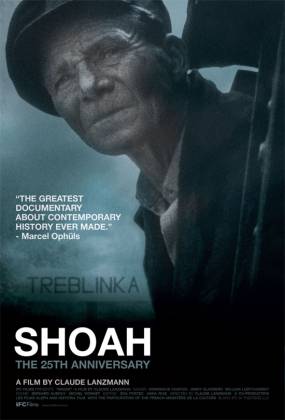The Greatest Documentary Ever Made
By Rob Christopher in Arts & Entertainment on Jan 18, 2011 4:40PM
 Mere hyperbole? No. Shoah does not include any black & white newsreels. It does not feature dramatizations, vintage photographs, or even documents from the period. It does something much more brilliant to convey the enormity of the Holocaust: using only interviews with survivors and contemporary footage of the locations in question, it creates a portrait of these unfathomable events entirely in the audience's mind, a place where it can remain permanently. It's a colossal achievement entirely without equal in the world of documentary filmmaking.
Mere hyperbole? No. Shoah does not include any black & white newsreels. It does not feature dramatizations, vintage photographs, or even documents from the period. It does something much more brilliant to convey the enormity of the Holocaust: using only interviews with survivors and contemporary footage of the locations in question, it creates a portrait of these unfathomable events entirely in the audience's mind, a place where it can remain permanently. It's a colossal achievement entirely without equal in the world of documentary filmmaking.
Although Claude Lanzmann, the film's director, insists the film is not a documentary at all. Now 85, he fought with the Resistance in France and became a journalist before beginning work on the film, which took 12 years to complete. He argues that it's not really a documentary because, "I did not record a reality that pre-existed the film, I had to create that reality." David Denby describes it this way: "By relying on the testimony of participants, Lanzmann brought the past into the present—the eternal present, renewed in the act of existential re-creation before the camera." The film is an exceedingly meticulous construction that shows, bit by painful bit, how (as Leonard Maltin puts it) the unthinkable became reality.
Many years ago we were assigned to watch Shoah for an assignment, and the only way we could see it was sitting at a video carrel in the Spertus Institute. Needless to say we dreaded the prospect of watching a ten-hour Holocaust documentary. But a strange thing happened. The longer we watched, the more gripping the film became. Having finished Part I, at day's end we actually found ourselves eager to return the next day for Part II. It was, in a twisted way, the saddest suspense film we'd ever seen--we knew the outcome full well but the unfolding of events was nonetheless riveting. To this day we've never had such a physical reaction to a film: a sickening feeling from the events described, to be sure, but also curiously elated and astonished by how the film quietly and patiently hammers away at the truth. Seeing the film is an investment of your time with a guaranteed return. You'll never forget it.
Shoah (from the Hebrew word for "destruction") opens on January 22 at the Siskel Film Center, 164 N. State St.